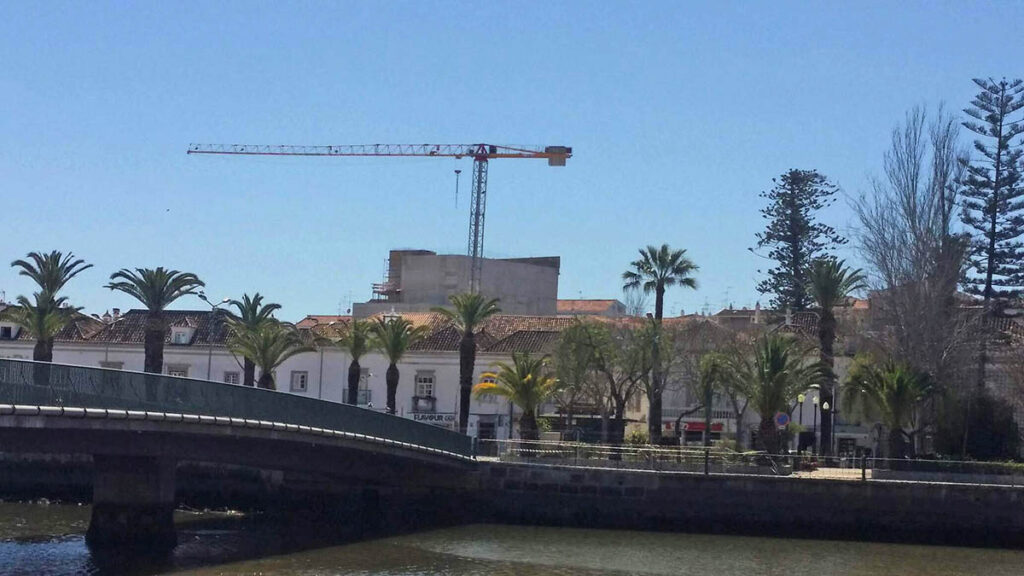The inauguration of a theater of the size of the recovered and enlarged Cineteatro António Pinheiro, in Tavira, is a very important event for a city, due to the undeniable advantages it brings to it, to neighboring cities and to the region. For this reason, citizens should be called upon to discuss the use of such equipment.
The history of Cineteatro António Pinheiro has crossed several generations and administrations, with ups and downs.
Since the restoration of the building, which was slowly dying out, was finally started, three years have passed and the work is growing. In fact, it grows so much that it's even frightening.
The dimensions of the stage box of the new Teatro António Pinheiro will allow almost everything that the human imagination conceived in terms of live performances to be presented there. It is true.
However, it seems that no one realized what would be the impact of this volume on the place where the theater is located.
The photographs of the amazing tower that are being published are taken from angles that accentuate its size, but even so, the stage box seems too tall, not for its intended purpose, but for the area of the city where the building is located. is inserted.
It would look good on a townhouse with its own parking lot. It is a pity that this solution was not chosen, but discussing it now is a pure waste of time.
The theater can receive 300 people seated or between 600 and 700 standing, removing the chairs. Selling 300 tickets seems easier than 600, but maybe there's more audience interested in concerts pop-rock what you watch standing, than in the subjects you watch sitting.
Should Cineteatro António Pinheiro put itself in the “market” based on a rich program of successful names in various disciplines, proposed by a cultural programmer, to serve local populations (and even Huelva)?
Or should I have a renowned artistic director to “sign” a program dedicated to an aesthetic aspect of recognized quality?
In the name of democracy, any of the nominees should have a limited mandate and none of them should be a civil servant, because, according to the Portuguese Constitution, everything related to cultural enjoyment and creation “is up to the State in collaboration with all cultural agents ”.
The role defined for politicians and public servants is that of “encouraging and ensuring access by all citizens to the means and instruments of cultural action, and “supporting initiatives that encourage individual and collective creation”.
The key idea for developing any cultural policy is based on this premise: working together. Politicians and civil servants support, citizens create.
And how should it be administered? There are many models. I can refer this link to a comparative study of European cultural spaces I did a few years ago, but that is still valid in terms of examples. There is material for inspiration.
Afterwards, it will be necessary to finance the programming. Equipping that tower with the necessary mechanisms: warp, cycloramas, sound and light equipment, projectors and screens, among other things, with constant maintenance, will be very expensive, but absolutely necessary for the chosen architectural model to make sense.
It will also be costly to keep the team to be hired to support the person responsible for creating the program: management, production, dissemination, home front, technique, maintenance must be dealt with... because sustainable programming, in a theater of that size, is not just about professionals paid by the day or equipment rented by the day.
And it has to be decided whether this structure will be just a reception or whether it will also have its own production, and whether or not it will rent its facilities for external use as a financing strategy.
It will always be necessary to deal with the constraints of our small town. The council has some individual artists and musical groups who are professionals, and about three dozen associations of amateur or semi-professional artists from various disciplines, to which it gives some support, partially supporting specific programs or creations that the associations manage to produce with a large dose free professional or amateur volunteering.
In any model, it will be imperative and fair to reserve enough time to use this space for all of them.
There are many questions to be answered, but there is no doubt that conditions will exist in this theater (at least architectural) to host even an adaptation of the opera “Aida”, by Verdi… perhaps without a full orchestra and with a more modest choir, but with the right to an elephant .
Would there be enough ticket revenue to cover the costs of such an event? Advance ticket sales in the national and international market can be considered. Prices range from 20 to 100 euros in Lisbon, or from 200 to 900 euros in Vienna, Austria. How much could they cost in Tavira?
And are there already fundraising plans and mechanisms to make this investment of 5 million euros profitable? As they say in the land of proverbs… it's time to get down to work, because “whoever walks in the rain gets wet”…
Author: Tela Leão is a cultural programmer and president of the cultural association Partilha Alternativa




















Comments